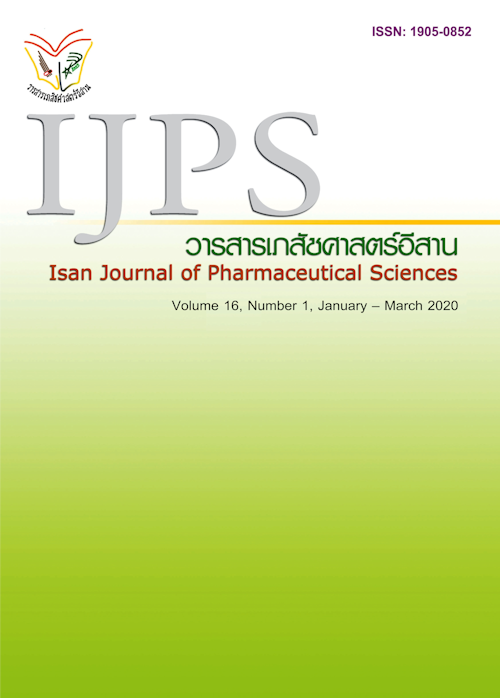Management of Chronic Constipation for Community Pharmacist
Main Article Content
Abstract
Chronic constipation is a common disorder in drug store and an important problem which affects to public health system. Chronic constipation is classified into two types, 1) primary constipation is a symptom-based disorder that results from slow transit constipation, dyssynergic defecation or constipation-predominant irritable bowel syndrome 2) secondary constipation results from various factors such as neurological diseases or some medications. Treatment of secondary constipation focuses on management of causes of constipation. The role of community pharmacists for patients with chronic constipation including to assess the medical history, symptom severity and investigate alarm symptoms to consider about treatment settings of patients between drug store or referral to hospital. Treatment of chronic constipation should provide both lifestyle modification with pharmacotherapy. Goal of therapy included relief symptom, prevent complications, improve quality of life and provide satisfaction to patient for short and long term care. Therefore, selection of laxatives should focus on long term efficacy and safety. Osmotic laxatives, such as lactulose or polyethylene glycol, are first-line treatment. Strategies of switching or add-on stimulant laxatives can be used in patients with nonresponse to osmotic laxatives. Patients with chronic constipation, who still do not response to treatment, should consider novel laxatives that have specific mechanism such as serotonin receptor agonists.
Article Details
In the case that some parts are used by others The author must Confirm that obtaining permission to use some of the original authors. And must attach evidence That the permission has been included
References
Afsar B, Elsurer R, Bilgic A, et al. Regular lactulose use is associated with lower peritonitis rates: an observational study. Perit Dial Int 2010; 30: 243-6.
Ahmed S, Gunaratnam NT. Melanosis coli. N Engl J Med 2003; 349: 1349.
Ballongue J, Schumann C, Quignon P. Effects of lactulose and lactitol on colonic microflora and enzymatic activity. Scand J Gastroenterol Suppl 1997; 222: 41-4.
Body C, Christie JA. Gastrointestinal diseases in pregnancy: nausea, vomiting, hyperemesis gravidarum, gastroesophageal reflux disease, constipation, and diarrhea. Gastroenterol Clin N Am 2016; 45: 267-83.
Brandt LJ, Prather CM, Quigley EMM, et al. Systematic review on the management of chronic constipation in North America. Am J Gastroenterol 2005; 100: S5-22.
Camilleri M, Ford AC, Mawe GM, et al. Chronic constipation. Nat Rev Dis Primers 2017; 3: 17095.
Clausen MR, Mortensen PB. Lactulose, disaccharides and colonic flora: clinical consequences. Drugs 1997; 53(6): 930-42.
Connolly P, Hughes IW, Ryan G. Comparison of Duphalac and irritant laxatives during and after treatment of chronic constipation: a preliminary study. Curr Med Res Opin 1974; 2: 620-5.
Ford AC, Moayyedi P, Lacy BE, et al. American College of Gastroenterology monograph on the management of irritable bowel syndrome and chronic idiopathic constipation. Am J Gastroenterol 2014; 109: S2-S26.
Gattuso JM, Kamm MA. Adverse effects of drugs used in the management of constipation and diarrhea. Drug Saf 1994; 10(1): 47-65.
Gwee KA, Ghoshal UC, Gonlachanvit S, et al. Primary care management of chronic constipation in Asia: the ANMA chronic constipation tool. J Neurogastroenterol Motil 2013; 19: 149-60.
Kienzle-Horn S, Vix JM, Schuijt C, et al. Efficacy and safety of bisacodyl in the acute treatment of constipation: a double-blind, randomized, placebo-controlled study. Aliment Pharmacol Ther 2006; 23: 1479-88.
Koppen IJ, Lammers LA, Benninga MA, et al. Management of functional constipation in children: therapy in practice. Pediatr Drugs 2015; 17: 349-60.
Lembo A, Camilleri M. Current concepts: chronic constipation. N Engl J Med 2003; 349: 1360-8.
Li F, Fu T, Tong WD, et al. Lubiprostone is effective in the treatment of chronic idiopathic constipation and irritable bowel syndrome: a systematic review and meta-analysis of randomized controlled rtrials. Mayo Clin Proc 2016; 91(4): 456-68.
McKeage K, Plosker GL, Siddiqui MAA. Lubiprostone. Drugs 2006; 66(6): 873-9.
Mcrorie JW, Daggy BP, Morel JG, et al. Psyllium is superior to docusate sodium for the treatment of chronic constipation. Aliment Pharmacol Ther 1998; 12: 491-7.
Mishima E, Fukuda S, Shima S, et al. Alteration of the intestinal environment by lubiprostone is associated with amelioration of adenine-induced CKD. J Am Soc Nephrol 2015; 26: 1787-94.
Muller- Lissner S. Pharmacokinetic and pharmacodynamic considerations for the current chronic constipation treatments. Expert Opin Drug Metab Toxicol 2013; 9(4): 391-401.
Osorio M, Giraldo GC. Gastrointestinal manifestations of chronic kidney disease. Rev Colomb Nefrol 2017; 4: 3-12.
Quigley EMM, Neshatian L. Advancing treatment options for chronic idiopathic constipation. Expert Opin Pharmacother 2016; 17: 501-11.
Rao SSC, Rattanakovit K, Patcharatrakul T. Diagnosis and management of chronic constipation in adults. Nat Rev Gastroenterol Hepatol 2016; 13: 295-305.
Servey J, Chang J. Over-the-counter medications in pregnancy. Am Fam Physician 2014; 90(8): 548-55.
Shin JE, Jung HK, Lee TH, et al. Guidelines for the diagnosis and treatment of chronic functional constipation in Korea, 2015 revised edition. J Neurogastroenterol Motil 2016; 22: 383-411.
Sood MR. Recent-onset constipation in infants and children [Internet].Waltham (MA): UpToDate; 2019. [cited 2019 July 22]. Available from: http://www.Uptodate.com.
Sueyoshi M, Fukunaga M, Mel L, et al. Effect of lactulose on renal function and gut microbiota in adenine-induced chronic kidney disease rats. Clin Exp Nephrol 2019; 23: 909-19.
Trottier M, Erebara A, Bozzo P. Treating constipation during pregnancy. Can Fam Physician 2012; 58: 836-8.
Wald A. Constipation: advances in diagnosis and treatment. JAMA 2016; 315: 185-91.
Wald A. Is chronic use of stimulant laxatives harmful to the colon? J Clin Gastroenterol 2003; 36(5): 386-9.


